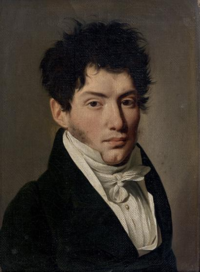You can help expand this article with text translated from the corresponding article in French. (December 2017) Click for important translation instructions.
|
| Charles-Louis Havas | |
|---|---|
 | |
| Born | 5 July 1783 Rouen, Normandy, Kingdom of France |
| Died | 21 May 1858 (age 74) Bougival, Seine-et-Oise, France |
| Nationality | French |
| Education | Lycée Pierre-Corneille |
| Occupation | Businessman |
| Known for | founder of the first news agency Agence France-Presse Founder of advertising firm Havas) |
Charles-Louis Havas (French pronunciation: [ʃaʁl lwi avas]; 5 July 1783 – 21 May 1858) was a French writer, translator, and founder of the first news agency Agence Havas (whose descendants are the Agence France-Presse (AFP) and the advertising firm Havas).
Biography
Havas was born into a Jewish family of Hungarian descent in Rouen. In 1835, he founded the Agence Havas, aware of their growing interest in international affairs, translated foreign newspapers and then sold them to the French national press, local businessmen, and the government. Recognizing that newspapers were not always accurate and often biased, he explored the concept of having his own correspondents in the field who would supply his agency with information. He died at Bougival.
Two of his employees, Paul Reuter and Bernhard Wolff, later set up rival news agencies in London (the Reuters News Agency founded in 1851) and Berlin (the Wolffs Telegraphisches Bureau founded in 1849) respectively. In order to reduce overhead and develop the lucrative advertising side of the business, Havas's sons, who had succeeded him in 1852, signed agreements with Reuter and Wolff, giving each news agency an exclusive reporting zone in different parts of Europe. This arrangement lasted until the 1930s, when the invention of short-wave wireless improved and cut communications costs. To help Havas extend the scope of its reporting at a time of great international tension, the French government financed up to 47% of its investments.
References
- List of famous alumni on the Lycée’s official website (in French)
- "Watch No. 217: A Breguet masterpiece". Christie's. 15 May 2016. Retrieved 19 October 2023.
- Desmond, Robert W. (1978). The Information Process: World News Reporting to the Twentieth Century (PDF). University of Iowa Press. p. 134. ISBN 978-1-58729-045-9. Retrieved 19 October 2023.
FREDERIX, Pierre. De l’Agence d’information à Havas à l’Agence France Presse. Paris : Flammarion, 1959.
PALMER, Michael B. International News Agencies. A History. Palgrave Macmillan, 2019.
See also
- Charles-Louis Havas (French)
This article about a French writer or poet is a stub. You can help Misplaced Pages by expanding it. |
This article about a French journalist is a stub. You can help Misplaced Pages by expanding it. |